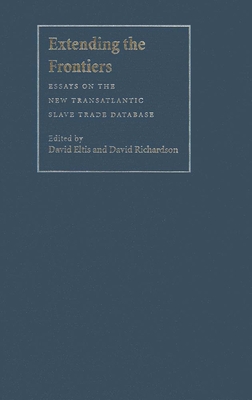

 Yale University Press
Yale University Press
Extending the Frontiers: Essays on the New Transatlantic Slave Trade Database


Key Metrics
- David Eltis
- Yale University Press
- Hardcover
- 9780300134360
- 9.3 X 6.2 X 1.2 inches
- 1.5 pounds
- History > Americas (North Central South West Indies)
- English
 Secure Transaction
Secure TransactionBook Description
Since 1999, intensive research efforts have vastly increased what is known about the history of coerced migration of transatlantic slaves. A huge database of slave trade voyages from Columbus's era to the mid-nineteenth century is now available on an open-access Web site, incorporating newly discovered information from archives around the Atlantic world. The groundbreaking essays in this book draw on these new data to explore fundamental questions about the trade in African slaves. The research findings--that the size of the slave trade was 14 percent greater than had been estimated, that trade above and below the equator was largely separate, that ports sending out the most slave voyages were not in Europe but in Brazil, and more--challenge accepted understandings of transatlantic slavery and suggest a variety of new directions for important further research.
For the most complete database on slave trade voyages ever compiled, visit www.slavevoyages.org.
Author Bio
David Eltis is Robert W. Woodruff Professor Emeritus of History, Emory University. He has a Ph D from the University of Rochester, (1979).
His research interests are the early modern Atlantic World, slavery, and migration - both coerced and free. He is the author of Economic Growth and The Ending of the Transatlantic Slave Trade (New York, Oxford Univ. Press, 1987) which won the British Trevor Reese Memorial Prize, and The Rise of African Slavery in the Americas (Cambridge, 2000), awarded the Frederick Douglass Prize, the John Ben Snow Prize, and the Wesley-Logan Prize.
He is also winner of the John T. Hubbell Prize for best article in the journal Civil War History, in 2008. Currently co-editor of the Transatlantic Slave Trade database at www.slavevoyages.org, he is also the principal investigator of a two year NEH funded collaborative project on the origins of Africans pulled into the transatlantic slave trade.
This project draws on the records of 67,000 names (taken down pre-orthographically) and descriptions of Africans liberated from slave vessels in the first half of the nineteenth century. The information was extracted from the registers of international courts that were established to adjudicate vessels detained as they engaged in the transatlantic slave trade.
Source: Emory College of Arts & Sciences
Community reviews
Write a ReviewNo Community reviews




